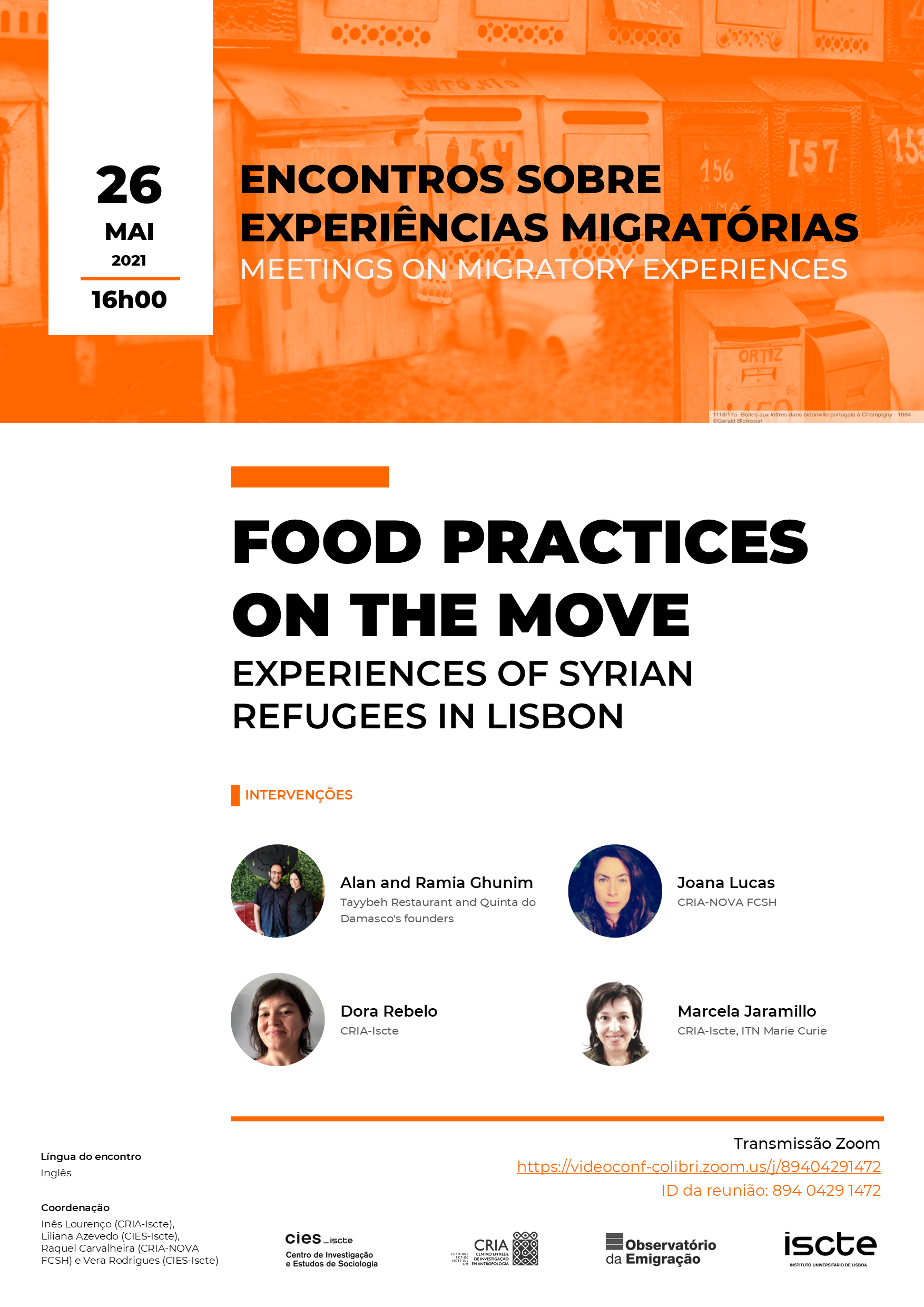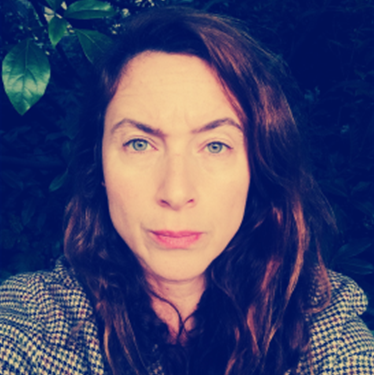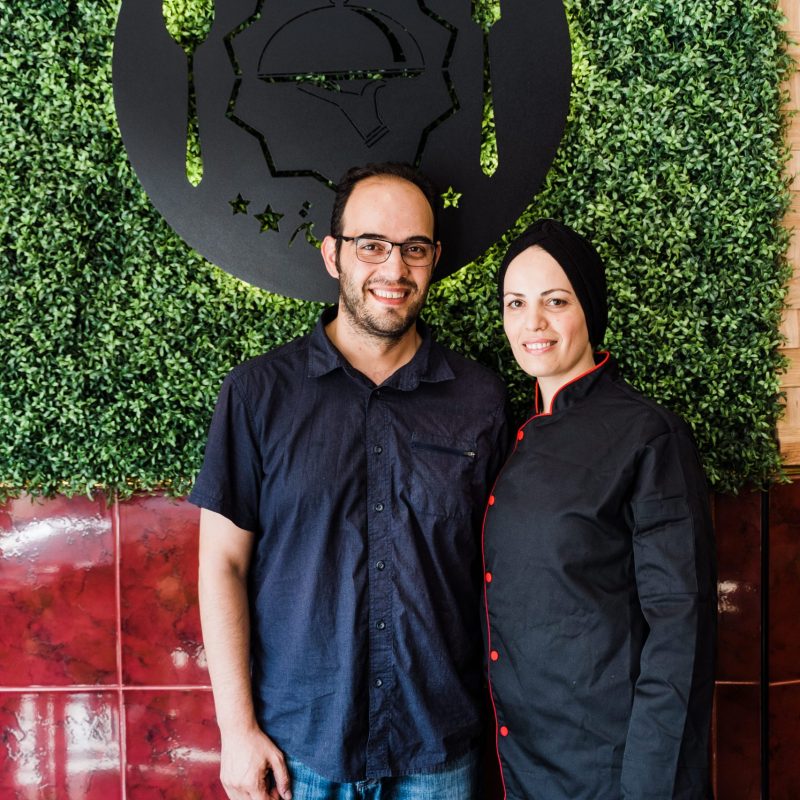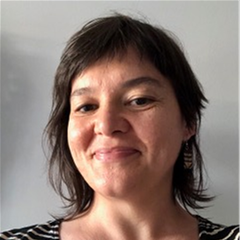- News
- Events
- Recurring Events
- Biographies and Trajectories
- Cidades & Impérios: dinâmicas locais, fluxos globais
- Cultural Diversity in Contemporary Families
- Meetings on China Studies
- Meetings Migration Experiences
- Social studies on science and the circulation of knowledge
- Public Policy Forum
- Research Forum CIES
- Gender, Sexuality and other social markers of difference
- ETNO.URB Readings
- Social Movements and Political Action
- New Perspectives on Modern History
- Revisiting the 19th Century
- Research Workshops
- Methodological Innovation Workshops
- Calls
→ Link Zoom: https://videoconf-colibri.zoom.us/j/89404291472
Meeting ID: 894 0429 1472

Abstract
All human beings share a common practice, we consume food. However, this practice differs from place to place, not only in the way we eat, but how we eat, when we eat, and with whom we eat. Such differences translate into what identifies the cultural identity of a collectivity. As a result of the war in Syria, many people fled their country, and during their diaspora, they have carried their food customs with them. In the places where they have settled, they have not only managed to adapt their food practices in a context different from their own but have also undertaken projects to make their traditional food known to the local community. This session will focus on how the food practices of the Syrian refugees evoke nostalgia for their past while reinforcing their sense of belonging to a country they no longer inhabit. Specifically, we will discuss the transformations of food practices that the Syrian community has undergone or not since its arrival in Lisbon, both in relation to their dishes, food products, kitchen objects, sensory experiences, and the customs surrounding food within their families and with their friends. It will also review the challenges refugees have faced in the projects they have undertaken on Syrian food, and how their food practices have been assumed by the local
|
|
Alan and Ramia Ghunim Tayybeh Restaurant and Quinta do Damasco's founders
Tayybeh Restaurant and Quinta do Damasco's founders |
 |
Joana Lucas CRIA-NOVA FCSH
Has a PhD in Anthropology (2014) from NOVA FCSH. She is a post-doctoral researcher (CRIA-NOVA FCSH), developing research on the effects of the patrimonialization of the "Mediterranean Diet" in Tavira (Portugal) and Chefchaouen (Morocco). She has lectured in the scope of Anthropology of Food: Anthropology of Food (NOVA FCSH, 2016/2017), Portuguese Gastronomy and Culture(CIEE NOVA FCSH, 2019), Human Ecology, Nutrition and Chronic Diseases(DCV, UC 2019-2020), Food and Culture: an Introduction to the Anthropology of Food(Summer School NOVA FCSH, 2017-2020). |
|
|
Dora Rebelo
Is a psychologist, a mental health and psychosocial support consultant in humanitarian projects and a PhD graduate in Anthropology. Since 2015, her work has been focusing on solidarity networks and collaborative research with refugees and asylum seekers. She is an associated researcher at CRIA/Iscte and has been an activist and volunteer at refugee-led associations. |
 |
Marcela Jaramillo
Has dedicated her professional life to working with cultural heritage, mainly in contexts of armed conflict. Her work has focused mainly on intangible heritage, heritage disaster risk management, but also on the engagement of local communities with World Heritage. She is a member of ICCROM's International Committee for Intangible Heritage, ICICH, and of the European Commission's Expert Group on Migration.And her PhD project in anthropology (CRIA-ISCTE) under the ITN Marie Curie focuses on the food practices of Syrian refugees in Lisbon. |
Meeting Language:
Inglês
Coordination:
Inês Lourenço (CRIA-Iscte)
Liliana Azevedo (CIES-Iscte)
Raquel Carvalheira (CRIA-NOVA FCSH)
Vera Rodrigues (CIES-Iscte)





